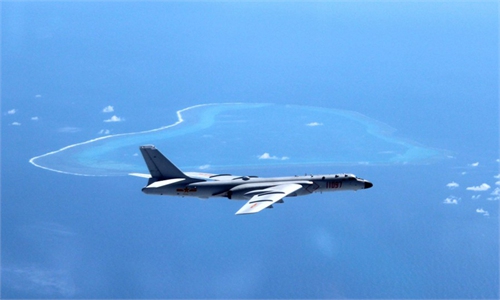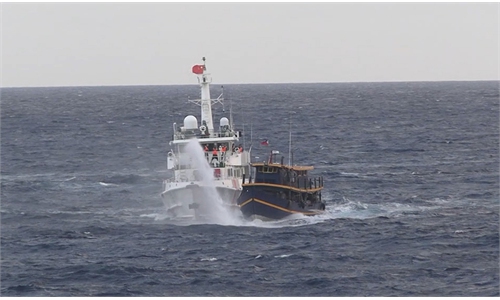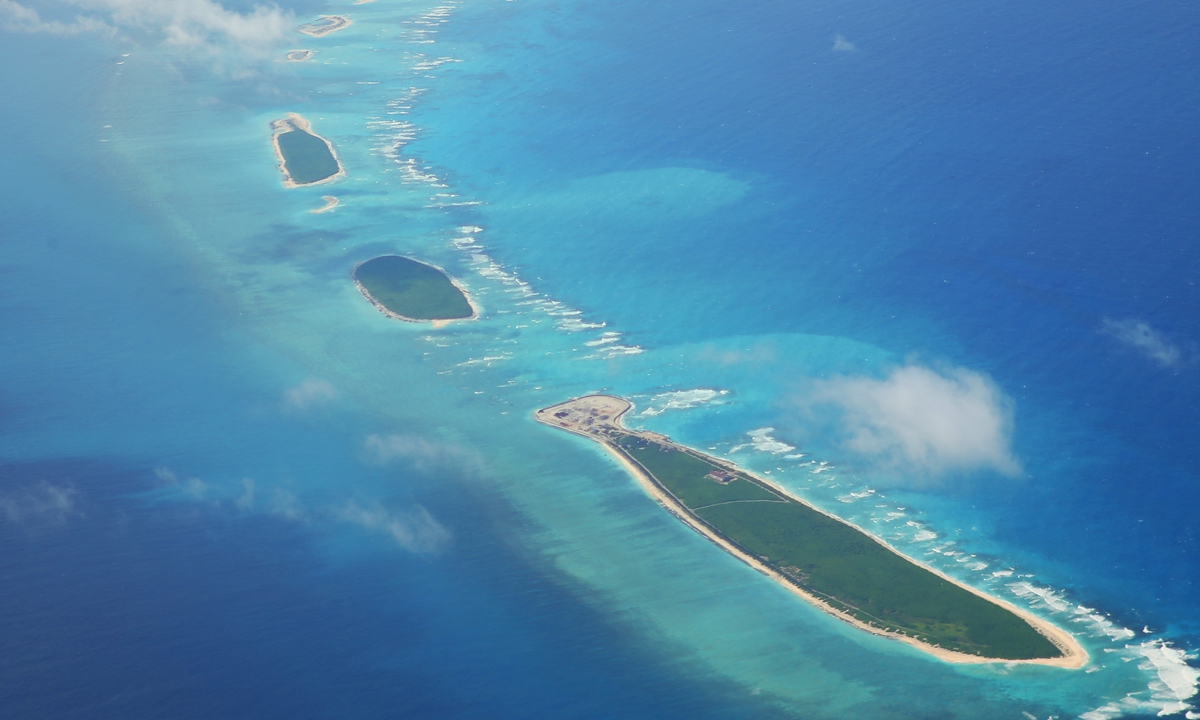
An aerial view of Qilianyu Islands in Sansha, South China's Hainan Province. Photo: VC
Editor's Note:
"Cognitive Warfare" has become a new form of confrontation between states, and a new security threat. With new technological means, it sets agendas and spreads disinformation, so as to change people's perceptions and thus alter their self-identity. Launching cognitive warfare against China is an important means for Western anti-China forces to attack and discredit the country. Under the manipulation of the US-led West, the "China threat theory" has continued to foment.
Some politicians and media outlets have publicly smeared China's image by propagating false narratives such as the "China economy collapse theory" and "China virus threat theory," in an attempt to incite and provoke dissatisfaction with China among people in certain countries.
These means all serve the seemingly peaceful evolution strategy of the US to contain China's rise and maintain its hegemony.
The Global Times is publishing a series of articles to systematically reveal the intrigues of the US-led West's cognitive warfare targeting China, and expose its lies and vicious intentions, in an attempt to show international readers a true, multi-dimensional, and panoramic view of China.
This is the eighth installment in the series. In this story, the Global Times looks into how the Group of Seven (G7) attempts to tarnish China's image and jeopardize the peace and tranquility in the region with various cognitive warfare tricks.
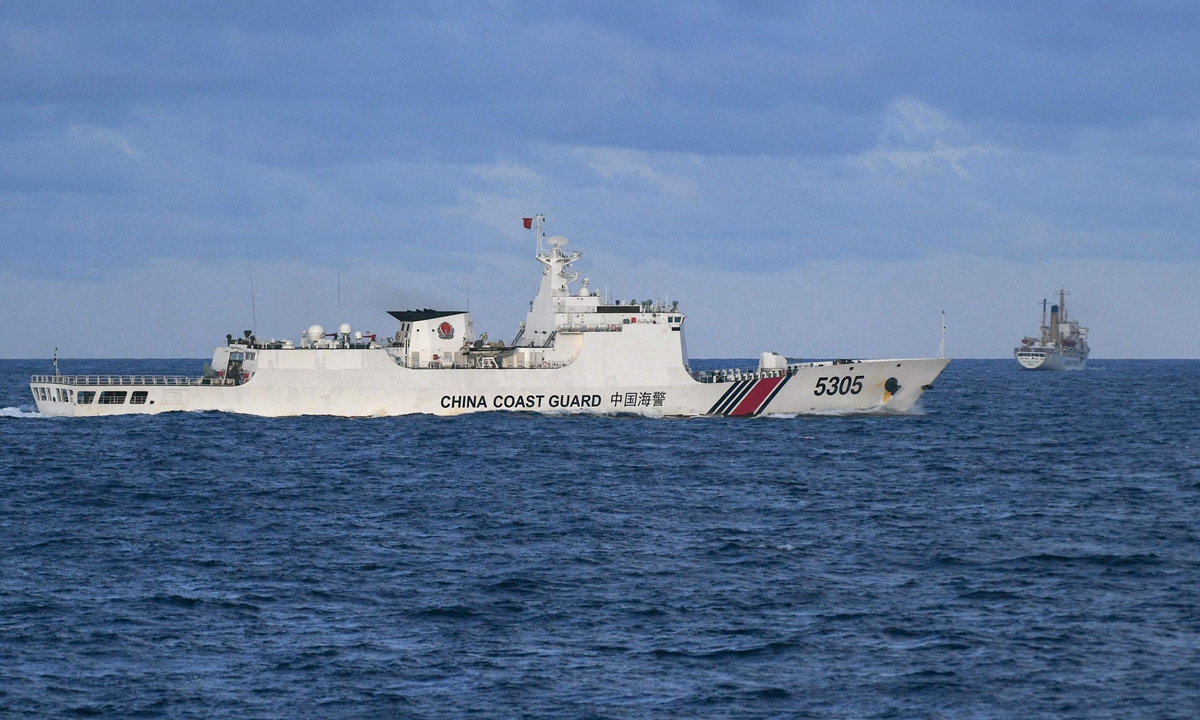
A Chinese Coast Guard ship drives away a Philippine vessel (right) in the South China Sea, on December 10, 2023. Photo: Visual News
The Group of Seven (G7) has been hyping the South China Sea issue synchronously under the US leadership. In the latest statement released earlier this month, the G7 once again claimed to oppose China's militarization activities in the South China Sea, and, not surprisingly, mentioned the so-called South China Sea arbitration.
These cliché accusations, as well as G7's repeated hypes of the South China Sea issue, have become "a part of the group's carefully planned cognitive warfare against China," said some Chinese observers reached by the Global Times. They pointed out that, through consistently creating strife in the South China Sea, provoking conflict between China and related countries in the region, and even inciting the latter to initiate troubles against China, the G7 attempts to harm China's sovereignty, denigrates China's international image, and jeopardize the peace and tranquility in this region.
The media disinformation campaign is far from the only means used, the Global Times found. Within the framework of the G7, governments, legal professions, media outlets, and academic institutes have largely participated in this cognitive war targeting China in terms of the South China Sea issue.
Murky blue sea interference
The G7, as one of the most powerful and influential intergovernmental political and economic groups in the West, is very good at attacking China over the South China Sea issue in the form of a joint declaration or statement by government heads or top officials among its members, to delegitimize China's rights and interests in the South China Sea at superficially "official" and "formal" occasions.
Apart from the latest statement, the G7 has released several similar joint statements detailing its "concerns" over the South China Sea issue in 2023 alone.
On November 8, 2023, G7 foreign ministers released a statement in Tokyo, stating that they "remain seriously concerned about the situation in the East and South China Seas," and "strongly oppose any unilateral attempts to change the status quo by force or coercion." Similar sentiments were also seen in another statement released after they met in New York in September.
Earlier in May, the G7 also hyped China-related issues in the G7 Hiroshima Leaders' Communiqué and other documents adopted at the G7 Hiroshima Summit, including irresponsible comments on the situation in the Taiwan Straits, and accusations regarding regions like the South China Sea.
Uniformly, these statements mentioned the South China Sea arbitration, saying the award rendered by the Arbitral Tribunal in 2016 "is legally binding upon the parties to those proceedings, and a useful basis for peacefully resolving disputes between the parties."
The fact is that the arbitration, without actual legal effect, has been widely considered a political farce under the cloak of law, said scholars of boundary and marine studies.
"The South China Sea arbitration was conducted by an arbitral tribunal without jurisdiction in violation of the procedures set out in Articles 283 and 298 of the UNCLOS (United Nations Convention on the Law of the Sea). There is no basis in international law, and it (the arbitration) has no legal binding force on China," said Wu Wei, an associated professor in China Institute of Boundary and Ocean Studies of Wuhan University.
Wu said that in 2023 since the US and the Philippines released the "Joint Statement of the US-Philippines 2+2 Ministerial Dialogue" in April, the US-led G7 has further meddled in the South China Sea issue.
"At the level of international law, it has violated the DOC (Declaration on the Conduct of Parties in the South China Sea), the UNCLOS, and the basic principles of non-intervention in domestic affairs," she told the Global Times.
Similarly, the "Limits in the Seas No.150" report that the US Department of State released in January 2022, which said it "examines the maritime claims of the People's Republic of China in the South China Sea" based on the UNCLOS, was also no more than a political tool of attack by the US against China under the guise of law, observers commented.
"The US itself has not ratified the UNCLOS," noted Wu. "Washington's interference in the South China Sea issue has hindered the normal implementation of the Convention."
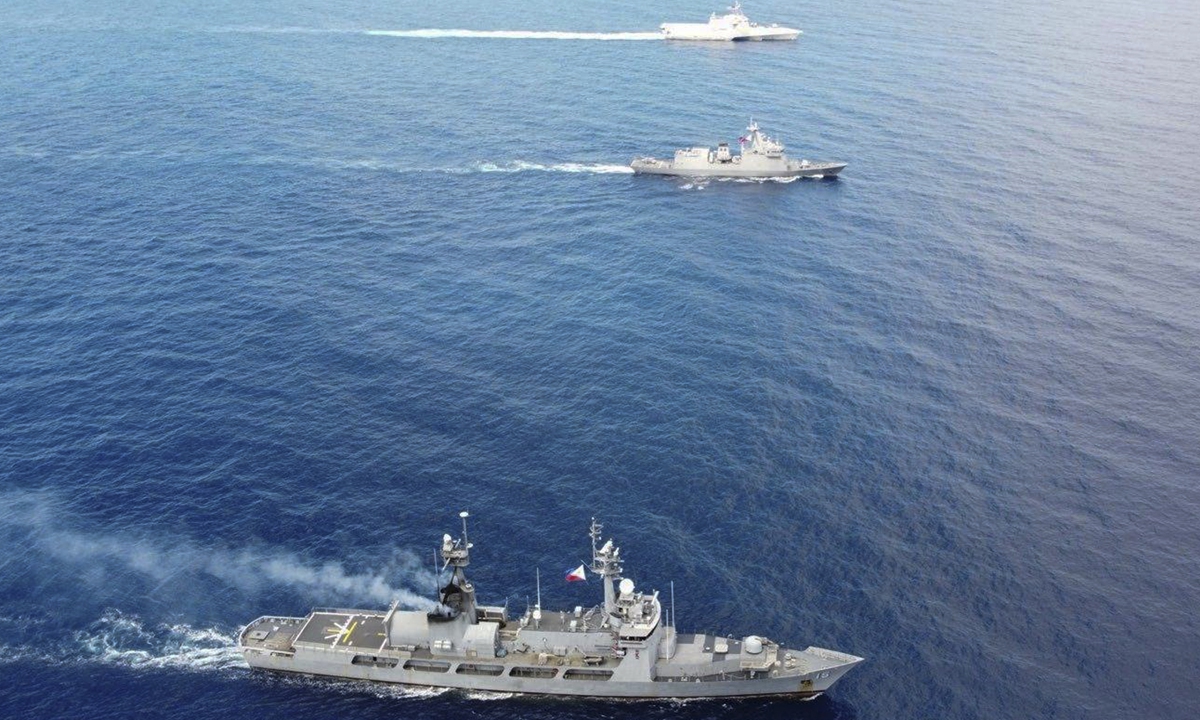
The US and the Philippines conduct the so-called joint air and maritime patrols in the South China Sea, on November 23, 2023.
Hypes from media, academy community
G7 members have continually added fuel to the fire in the South China Sea issue, with Western media outlets amplifying their incendiary talking points. This year, US media outlets such as The New York Times, The Washington Post, and Time magazine have extensively reported on the maritime conflicts between China and the Philippines.
Throughout 2023, when the Philippine Coast Guard (PCG) stirred up trouble in the South China Sea, it contrived the accompaniment of local and Western media entities on many occasions, with mainstream Western media outlets such as the New York Times, NBC, and AFP being invited to join Philippine journalists. The Foreign Correspondents Association, representing foreign media in the Philippines, has also been in contact with the Philippine Department of Foreign Affairs and Department of Defense to coordinate journalists' boarding for interviews.
Presumably dissatisfied with journalists' inability to capture good photos on board, the US military has dispatched P-8A anti-submarine patrol aircrafts to assist the PCG in their resupply operations at Ren'ai Jiao (Ren'ai Reef). These aircrafts captured high-definition videos and photos, which were used for sensationalist purposes by Western countries and Philippine media outlets.
In an effort to assist the Philippines in its dispute with China, some third-party countries are seeking advice from their own think tanks. One notable case is that of Project Myoushu at Stanford University in the US, which focuses on South China Sea security issues.
In February, Project Myoushu claimed that "China harasses PCG vessel." Subsequently, the PCG asserted that a Chinese ship had directed laser at the PCG, and the US State Department spokesperson, Ned Price, further fanned the flames by stating that the US stands with their ally in the face of alleged laser incidents.
In the context of the Chinese Foreign Ministry's clarification of the facts and emphasis on the Philippine side's baseless accusations, Raymond Powell, Project Myoushu team lead and a retired US Air Force colonel, claimed that the actions of Project Myoushu pushed the Philippine government to finally decide to expose the maritime dispute between China and the Philippines.
In addition, the Asia Maritime Transparency Initiative at the Center for Strategic and International Studies (CSIS) is also a major project in the US that focuses on researching the South China Sea issue.
Over the years, this project has repeatedly accused China of "disrupting the status quo" and "threatening regional security" when releasing information about China's rights protection and law enforcement activities in the South China Sea.
However, it selectively ignores unilateral actions such as island construction and militarization by other claimant countries in the disputed waters.
In recent discussions between several US and the Philippine think tanks, various ideas regarding the US-Philippines cooperation in occupying Ren'ai Jiao were generated. In terms of logistical support, some have suggested that Western military forces should assist the PCG in delivering supplies to the grounded vessel, or even consider airdropping them using military aircrafts.
Currently, the Philippines is intensifying its propaganda campaign in the South China Sea in collaboration with foreign media sources and think tanks, using various tactics to overstate the severity of the conflicts between China and the Philippines in the South China Sea. Behind this is a mindset of sensationalism, deliberately portraying China as aggressively attacking and bullying a smaller country - the Philippines, Peng Nian, vice president of the Regional National Research Institute at the Hainan Normal University, told the Global Times.
"The more they exaggerate and amplify these negative incidents, the more it seems beneficial for the Philippines and the West. It not only maligns China, but also magnifies the South China Sea issue, continuously attracting international attention," Peng said. However, in reality, apart from escalating tensions in the South China Sea, these performers are only deceiving themselves with the illusion of enhanced influence, he noted.
A 'test site' to suppress China
The South China Sea is another "test site" for some Western countries, including the G7, to isolate and contain China, said observers.
By constantly hyping the South China Sea issue, they try to influence the international community and the Chinese public to force the Chinese government to change its foreign policy, Chen Xiangmiao, director of the World Navy Research Center at the National Institute for South China Sea Studies, told the Global Times in a previous interview.
To safeguard China's legal interests in the South China Sea, and to contribute more to the peaceful and stable development of the region, Wu from Wuhan University suggested that China should actively take countermeasures from multiple aspects, which include hosting summits for peaceful consultations between China and ASEAN (Association of Southeast Asian Nations) countries on the South China Sea situation, further encouraging fishermen to conduct fishing operations in the region with more guaranteed protection.
"It's also necessary to further promote international law studies on the South China Sea issue, to gain more say for China in today's global international law community on topics regarding this region," Wu told the Global Times.
Gone are the days when a handful of Western countries could willfully meddle in other countries' internal affairs and manipulate global affairs, said the Chinese Foreign Ministry on May 20, in response to the G7 Hiroshima Leaders' Communiqué released that same day.
"The international community does not and will not accept the G7-dominated Western rules that seek to divide the world based on ideologies and values. Even less will it succumb to the rules of exclusive small blocs designed to serve 'America-first' and the vested interests of the few," it noted. "G7 needs to reflect on its behavior and change course."
RELATED ARTICLES
#ASEAN needs to be wary that the #remilitarization of #Japan will be a threat to not only East Asia, but also Southeast #Asia. I don’t think anyone will serve him or herself well by forgetting about the atrocities that Japan committed in World War II. #ThinkBigger #VictorGao
